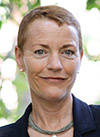A zigzagging road to the convent
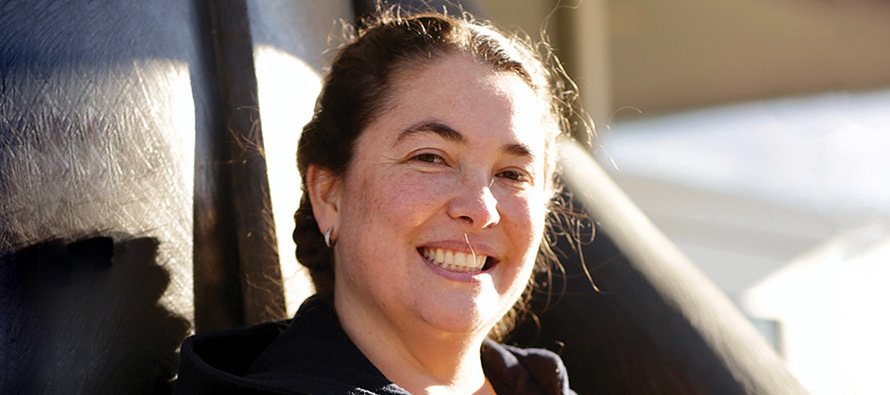
Sister Ana Gonzalez, O.P. didn’t walk a straight path to the convent, but the ups, downs, and confusing moments finally led her to a life she embraces with enthusiasm. (KVON Photography)
SISTER ANA GONZALEZ, O.P. believed from an early age that she would get married and have children. But her heart kept leading her in another direction. This is the story of her path as it wound across the country, through varied professions, friendships, and love before finally arriving at the door of her heart.
Gonzalez remembers lying in her hospital bed, in pain and alone. She had ended up there after going sledding for the first time in her life. As an immigrant from Mexico who had grown up in Texas and gone to college in New Orleans before moving to Connecticut, she had rarely even seen snow. But it was part of her new home’s winter landscape, and she had jumped at the chance to play in it.
The accident happened on her fifth or sixth run down the sledding hill. She hit a bump and went airborne. The landing shattered two vertebrae. Her doctors now warned she might never walk again. She believed she would but was in no real hurry to leave the hospital. She needed the extra time and solitude to think.
She was thinking about her future. Now 33, the bubbly extrovert had come to New Haven, Connecticut full of joy as she worked to complete her application to enter the Dominican Sisters of Peace. She loved the congregation—the sisters, their work, mission, and vision—with all her heart. But something unexpected had happened along the way. She had fallen in love.
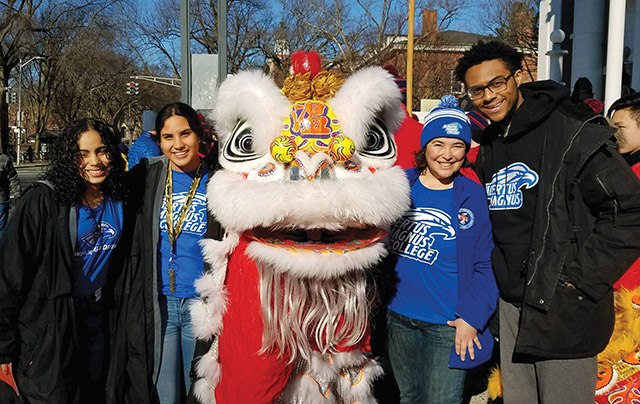
A religious upbringing
God had been as much a part of the Gonzalez family as any other member of their household. With an Evangelical-Protestant-turned-Catholic mother and a traditional-cradle-Catholic father, the children were constantly reminded to say prayers, pray the Rosary, and engage in a personal relationship with God.
“My parents instructed us in the faith in very different ways,” Gonzalez says. “Dad taught us to pray in traditional ways. Mom had a different approach. She would say, That person is Jesus. Or that person is an angel. She would ask, What’s in your heart? Can we listen to God?”
Gonzalez even played God games, pulling a makeshift veil over her head to look like a nun and playing the part of priest during pretend Mass for her siblings. By the time she was in high school, she had begun volunteering in her Jesuit-run parish. It was there that Gonzalez’ life began to follow an unexpected path.
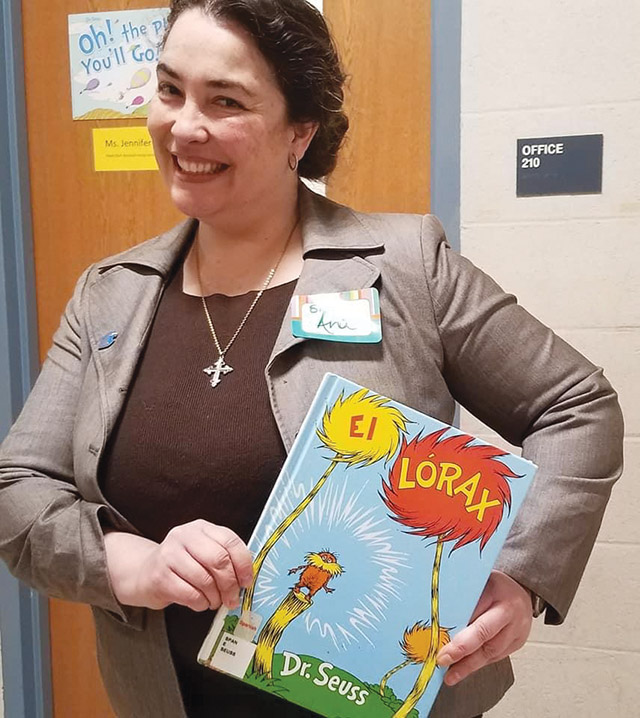
“My pastor asked me what I was going to study in college,” she remembers. “I knew I couldn’t go. My dad wanted me to be a stay-at-home wife like my mom. But my pastor said, I will recommend you to Loyola in New Orleans. I’m going to help you. The Jesuits had faith in me.
“By the grace of God I got accepted,” she says. “I remember that phone call vividly. Then I had to break the news to my dad. He was king in my family. When he says no it’s no. He said no.”
Again, the Jesuits intervened. They convinced Gonzalez’ father to let her go to Loyola, a Jesuit university, although he refused to provide much financial support. The Jesuits arranged living quarters and a campus job, which led to the Dominican Sisters.
New dreams
Gonzalez’ experience at Loyola began to open doors she hadn’t known even existed. No longer constricted by cultural or family expectations, she could make friends with people of other faiths, learn about different ideas and mindsets, pursue a career. Then she got a job playing music for Dominican sisters in their infirmary, and her world grew even larger.
“I had never had female mentors, rock star female mentors who cared about me,” Gonzalez says. “The sisters were making such a powerful influence in the world. They lived together with God at their center. They empowered me. They invited me to dream. I could be a rock star if I wanted. After I graduated, I decided to spend my life in New Orleans and got a job at an ad agency there.”
She also started—and stopped—discerning religious life with the sisters. Her mother had gotten sick. Her father had left the family. Gonzalez was asked to return to El Paso to help out. She packed up and moved back.
OF SISTER ANA GONZALEZ, O.P.
Most mornings, you’ll find Sister Ana Gonzalez hurrying across the parking lot from her convent to St. Stanislaus Church in New Haven, Connecticut. Mass starts at 7 a.m., and she’s almost always running late. Gonzalez has much to do every morning: Mass, morning prayer, and work, to say nothing of getting herself ready for the day.
Also, if she’s the sister responsible for dinner that night, she might have meal prep. Gonzalez lives with four other members of the 450-member Dominican Sisters of Peace, a global congregation focused on peacemaking.
Their small New England convent is specifically for sisters in initial formation, that is, the newbies. Here they serve in a ministry while also learning theology and Dominican spirituality, history, and vows.
Communal life involves adjustments. “I used to be in charge of my own time and resources,” Gonzalez points out. “Now I share these things. I have a lot of freedom, but am accountable to others. I have to plan carefully. I can get together with my friends, but I schedule around prayers, dinners, community activities.”
Adding it all up, Gonzalez is enthusiastic. “I’ve been blessed to experience community since coming here,” she says. “I love living in community."
Here’s how most days break down for her:
7 a.m.: Mass at St. Stanislaus Church
7:30 a.m.: Lauds (morning prayer) in the convent chapel, including readings from the Dominican Praise Book. “I love praying together. It’s grounding.”
9-5 p.m.: Work at the Dominican college, Albertus Magnus, as the coordinator of international admissions. “I love helping international students believe in themselves, the way my mentors helped me.”
6 p.m.: Dinner. “It’s always a lively and prayerful experience for us. We share where we had trouble during the day, what we experienced. We have deep and profound conversations.”
7 p.m.: Vespers (evening prayer). “The exact time varies, depending on how long we spend at dinner. Sometimes we don’t start till 8.”
After prayers: “Sometimes we will watch a Hallmark movie or a fun TV series together. We like nonviolent mysteries. The Crown is a current favorite. Sometimes I read or study.”
Check out the video “A Day in My Life,” that Gonzalez created: youtube.com/watch?v=9gYiiPhhj44
Signs everywhere
Gonzalez, a die-hard optimist, found many things to love about her new life. She was establishing an adult-based friendship with her mom, doing satisfying work for the Hispanic Chamber of Commerce, and volunteering at her parish. After a few years, though, she began to feel out of sorts.
“It was a balanced life,” Gonzalez recalls. “But I found myself asking, What’s the meaning of my life? I was getting closer to 30. By then Mom was married and had three kids. I thought, I have no purpose but to work. I remember praying to God, I want to work for you. Show me how.”
The first answer came shortly after, during a trip back to New Orleans for a wedding, when Gonzalez and her mother visited with one of her sister mentors.
“Sister Dorothy told me, I’ve tried to hint for years, but now I’m just going to say it. When are you going to join us? Mom doesn’t speak English, so she didn’t understand. But she said afterwards she suddenly saw me as a nun. She stopped pushing me to get married.”
More signs appeared. Gonzalez ran into two Dominican Sisters of Peace at an immigration reform protest attended by thousands of people in El Paso. Then the room in which she volunteered at church was renamed for Saint Dominic. When those coincidences failed to fully grab her attention, Gonzalez says an episode at Mass finally convinced her.
“I was asked to do the reading,” she says. “It was from Ecclesiastes. Basically it said You are working for an illusion. Why don’t you stop what you’re doing and work for God? Then the priest read the parable of the rich fool, who worked all his life only to die before he could enjoy it. I realized, This is my call. It culminated in this Mass. I felt it was meant for me.”
Gonzalez contacted the Dominican Sisters to begin discerning again in earnest. She attended Come and See retreats, talked with her mentors and the vocation director, visited the motherhouse in Columbus, Ohio. She says the moment she entered the door, it felt like home. It was time to tie up loose ends.
“Can’t you find a boyfriend?”
Gonzalez remembers every retreat as an affirmation of her feelings. Finally she says she told her vocation director it was “time to sign up. Energy and joy were radiating out of me. I wanted the world to know. I was stupid happy.”
Not everyone shared her happiness.
“I lost some friends,” Gonzalez says. “I felt judged by some, too. They would say, But you’re so pretty. Are you running away? Can’t you find a boyfriend?”
Gonzalez had dated, certainly. But the knee-buckling romance of movies had never been a part of her experience. Until she moved to New Haven. She had found a job there to be close to a group of Dominican sisters with whom she planned to live when she finished paying off her student debt and was accepted into the congregation. And then she met “Josh.”
“It was a shooting star moment,” she says. “I had crazy butterflies for this guy. It was the first time I’d ever been in love. I fell hard for him.”
Gonzalez had a lot to think about as she lay in that hospital bed.
“I wondered if this was God saying, You’re making a mistake,” Gonzalez says. “I prayed. I read every Henri Nouwen book I could find. I talked to the sisters. Those months were an opportunity to quiet myself, to think about what’s important and to really discern.”
Josh visited her in the hospital, as did her friends and sisters. Gonzalez laughs now at the awkwardness of the moment when Josh and her vocation director showed up at the same time. Her voice drops as she remembers how hard it was to tell him she needed a break to think things over.
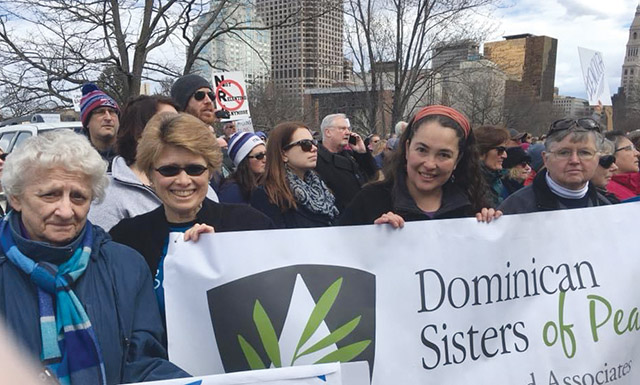
Signs of healing
Thanks to extensive surgery that included two rods, seven screws and three artificial vertebrae, Gonzalez could stand again. She had been injured at the end of December. By March she had started walking with walker, and in April she could walk with a cane. By May, she had made her decision.
“I told him how grateful I was for the experience,” she says. “It was one of the hardest conversations I’ve ever had. I wanted both so badly. But I always came back to religious life. I realized I was madly in love with God.”
All signs now pointed to healing and entering the congregation. Gonzalez applied for and received an education grant from the National Fund for Catholic Religious Vocations, which finished paying off her student loans. She was free to formally request entrance. Thus, January 18, 2014—one year after her surgery—she was welcomed into the Dominican Sisters of Peace.
“At the end of the ceremony, the sisters stretched out their hands in blessing to me,” Gonzalez says. “Those hands that have healed and comforted, those dear faces, those women on whose shoulders I’m standing. I was 33 years old. I have never looked back.”
Related articles: VocationNetwork.org, “The best decision I ever made” and “Why I’m a Catholic sister.”
For more on how to become a nun, how to become a Catholic sister, how to know your vocation, how to know God's will for you, what is it like to be a nun or Catholic sister, browse our article archive.
Tags
- catholic sister
- catholic nun
- called by god
- knowing your vocation
- ministry of catholic sisters
- community life for catholic sisters
Related
- A vocation found on the low road: Profile of Sister Thanh Pham, S.S.M.O.
- Missioned to make connections
- Need-to-knows about becoming a nun
- An art teacher is drawn to something greater: Profile of Sister Lisa Perkowski, I.H.M.
- What a flock of sheep taught its shepherdess
- Sister Vilma’s fearless faith
- Seeing God in a child’s smile: Profile of Sister Marie Elizabeth Jerry, S.S.F.
- Bringing sacred healing to hurting communities
- Sisters help Uvalde move from trauma to trust
- Camaraderie at its best: Profile of Sister Kristine Fernandes, C.S.J. Read More
Most Viewed
- Find your spirituality type quiz
- Questions and answers about religious vocations
- Celibacy quiz: Could I be a nun? Could I be a brother? Could I be a priest?
- Resources for older discerners or those with physical and developmental differences
- About Vocation Network and VISION Guide


